I’m still getting used to the idea that my daughter knows how to read. We have three newspapers arriving at the house each day, in addition to at least a half dozen magazines a week. And we leave these lying around without a second thought. If there’s a particularly graphic photo on the front page, I try to put it away discreetly, but until now I’ve never had to worry much about her media consumption. Her television watching consists almost entirely of cartoons streamed on the Netflix iPad app. But things are changing fast.
“What’s that a picture of?” she asked me this morning, pointing to a photograph of police combing a stretch of coastline for human remains. The article, called “The New Prostitutes,” is an account of the lives of several young women who were selling sex on sites like Craigslist and were all murdered, most likely by a serial killer targeting them.
Needless to say I quickly moved the paper and said something generic about how the police were looking for clues to solve crimes. She didn’t have time to ask me about any of the other key words.
The story itself is a disturbing account of the lives of working-class young women whom, the author suggests, were attracted to this life, not only out of some kind of financial exigencies, but also because it afforded them various benefits. In addition to making more money, the Internet meant they could be their own bosses, have flexible hours to take care of their children, etc. As the author notes,
They were not human-trafficking victims in the classic sense. They stayed close to their families. They all came to New York to take advantage of a growing black market — an underground economy that offered them life-changing money, and with a remarkably low barrier to entry. The real temptation wasn’t drugs or alcohol, but the promise of social mobility.
Indeed, the article, which turns into something of an argument for legalizing prostitution—the women wouldn’t have been killed if prostitution went on above ground, the argument goes—suggests that the anonymity of the Internet has completely transformed the “industry.”
In 2006, a research team from Princeton and Columbia said that this new wave of prostitutes had a “professional and careerist orientation.” Three years later, [a study found] the Web was drawing different sorts of people into prostitution — they were better educated and they were thinner. In 2011, Jennifer Hafer, a researcher at the University of Arkansas, said people embraced online prostitution “for many of the same reasons that people enter the conventional job market — money, stability, autonomy and even job satisfaction.”
I’m a little skeptical of the idea that the Internet has made prostitution into a legitimate career path. But it’s hardly news that both the anonymity and the immediacy of the web break down barriers and tempts people to behave in ways they otherwise would not dream of. The web has made our world smaller. It has reduced the barrier between the realm of the upstanding citizens and people selling their bodies. And it has brought some of the most disturbing stories to our kitchen tables. Better check the settings on the iPad now.






